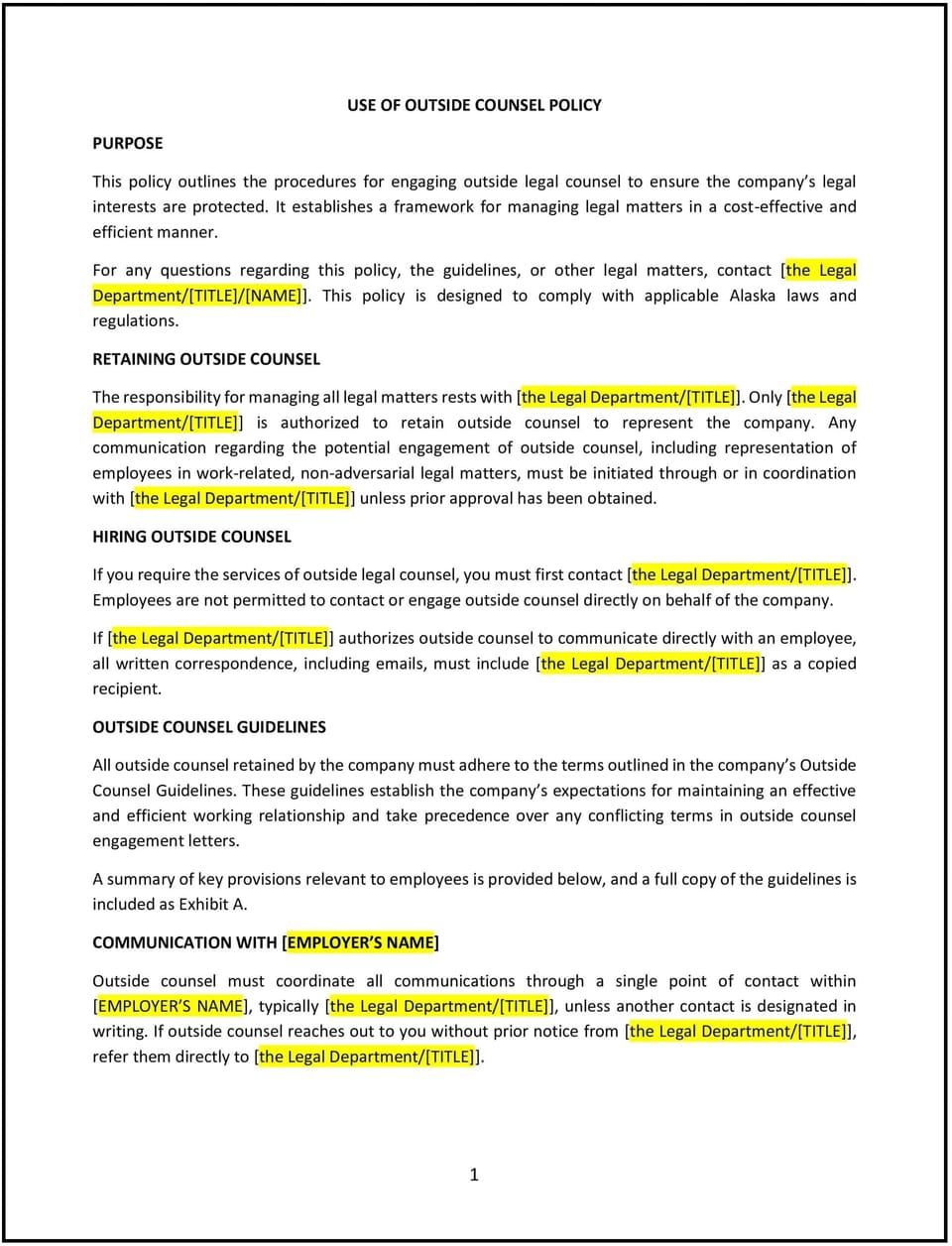Use of outside counsel policy (Alaska): Free template

Use of outside counsel policy (Alaska)
In Alaska, a use of outside counsel policy provides guidelines for engaging external legal advisors to address specific legal needs, manage complex cases, or supplement internal resources. This policy ensures that the use of outside counsel is cost-effective, strategically aligned with business goals, and compliant with legal and ethical standards.
By implementing this policy, businesses can streamline decision-making and maintain control over legal expenses.
How to use this use of outside counsel policy (Alaska)
- Define when to engage outside counsel: Specify circumstances where external legal support is appropriate, such as litigation, regulatory compliance, or specialized legal advice.
- Establish approval procedures: Require management or designated individuals to approve engagements to ensure alignment with company goals and budget.
- Include criteria for selecting counsel: Provide guidelines for evaluating and selecting legal advisors, including expertise, reputation, and cost structure.
- Address cost management: Outline expectations for billing, expense caps, and reporting to maintain transparency and control over legal costs.
- Emphasize confidentiality: Ensure that all communications and work with outside counsel are conducted securely and adhere to confidentiality agreements.
Benefits of using a use of outside counsel policy (Alaska)
A use of outside counsel policy provides several advantages for businesses in Alaska. Here’s how it helps:
- Ensures cost efficiency: Controls legal expenses by setting clear guidelines for when and how to engage external counsel.
- Enhances expertise: Enables access to specialized legal knowledge and skills for complex or industry-specific matters.
- Promotes consistency: Ensures that all engagements align with the company’s legal strategy and objectives.
- Protects confidentiality: Establishes secure processes for handling sensitive information shared with external legal advisors.
- Simplifies decision-making: Provides a structured approach for evaluating and selecting outside counsel.
Tips for using a use of outside counsel policy (Alaska)
- Tailor to business needs: Focus the policy on legal areas relevant to your business, such as employment law, regulatory compliance, or intellectual property.
- Monitor performance: Regularly evaluate the performance of outside counsel to ensure value and alignment with business objectives.
- Negotiate terms: Establish clear billing arrangements, including fixed fees or caps, to manage costs effectively.
- Maintain a preferred provider list: Develop and maintain a list of pre-approved legal firms or advisors to expedite engagement when needed.
- Update regularly: Revise the policy to reflect changes in legal requirements, business operations, or available resources.
Q: When should businesses engage outside counsel?
A: Businesses should engage outside counsel for specialized legal expertise, managing complex cases, or addressing regulatory compliance issues beyond the capacity of internal resources.
Q: How can businesses manage legal costs effectively?
A: Set clear budgets, negotiate fixed fees or caps, and require detailed billing reports from outside counsel.
Q: What criteria should businesses use to select outside counsel?
A: Evaluate counsel based on their expertise, industry experience, reputation, and cost structure to ensure they meet the company’s specific needs.
Q: How can businesses ensure confidentiality with outside counsel?
A: Require confidentiality agreements, use secure communication channels, and limit the sharing of sensitive information to authorized personnel only.
Q: How often should this policy be reviewed?
A: Review the policy annually or whenever significant changes occur in legal needs, business operations, or external legal markets.
This article contains general legal information and does not contain legal advice. Cobrief is not a law firm or a substitute for an attorney or law firm. The law is complex and changes often. For legal advice, please ask a lawyer.


